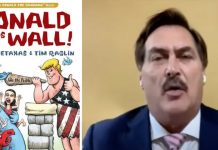The Trans Pacific Partnership (TPP)?is a corporate handout disguised as a trade deal. It gives multi-national corporations unprecedented rights and is being negotiated in secret.
There is no doubt about it. The Trans Pacific Partnership [TPP] is one of the largest trade deals in human history. The key elements of this legislation is that it’s still under negotiation and that its controversial and is being meet by a surprising element in Washington D.C. these days bi-partisan opposition from both Republicans and Democrats.
The TPP is ostensibly intended to be a “high-standard” agreement aimed at emerging trade issues in the 21st century.[11]?These ongoing negotiations have drawn criticism and protest from the public, advocacy groups, and elected officials, in part due to the secrecy of the negotiations, the expansive scope of the agreement, and controversial clauses in drafts leaked to the public. (Source Wikipedia)
However, you can rest assure that there are well-funded groups at all levels advocating this trade deal by so-called fast track legislation that began back in the Nixon days. But, in response to this fast track legislation just recently a letter was sent to President Obama by 151 House Democrats to end this controversial Nixon-era procedure. Fast-Track,?is a procedure that?railroads contentious trade pacts through Congress. Many progressive pundits have gone as far to blame the President as being a sell-out on this issue.
Obama has asked Congress to delegate to him its constitutional trade authority via Fast Track for the Trans-Pacific Partnership (TPP) and other pacts.
Lori Wallach, director of Public Citizen’s Global Trade Watch said:
These letters make clear that Fast Track is history. When Nixon cooked up this scheme 40 years ago, trade pacts covered only tariffs. Now, deals like the TPP could rewrite wide swaths of U.S. policy, currently under the control of Congress, from food safety and financial regulation to Buy American procurement to energy policy.
Effectively, this trade deal (TPP) could change how all of us interact with the global economy. You might think that President Obama would want to keep us all informed on this issue with his transparency pledge and there being swirling doubt coming from the Affordable Care Act disastrous roll out and people losing their health insurance no matter how much a junk policy it might ?be the Presidents honesty has been put to question.
The fact is these negotiations have been done almost entirely in secret. With Obamacare and the government shutdown the main focus of the main-stream media, this huge, major trade deal, which sets new rules and regulations, or lack thereof on some 12 nations from the Pacific realm, has gone largely unnoticed.
What fast track legislation means is the President is asking Congress to relinquish powers given to Congress by the Constitution to the Executive Branch. ?Fast Track lets the Executive Branch unilaterally select trade partners, set agreements? terms, and sign them before Congress even voted. Then the Executive Branch could write implementing legislation, skirting committee review and amendment.
Whats really disappointing is most of what we know about the TPP have come from leaks. What these leaks are revealing is that the TPP is a ?huge give away to large trans-national corporations. In short, this deal would allow these corporations to sue the governments of these 12 nations for the regulations thrust upon them. Moreover,?This legislation could be directly submitted for votes, with congressional leaders? control of House and Senate floor schedules overridden. Votes could be forced within 60 days in the House and an additional 30 days in the Senate. Normal voting rules were waved, with all amendments banned and only 20 hours of debate. Unlike all past trade authorities, which covered only tariffs, Fast Track allowed the executive branch to ?diplomatically legislate,? using trade agreements to set policy on non-trade matters.
Opponents of the Trans Pacific Partnership have argued that the TPP would sacrifice national sovereignty, public health, and internet freedoms all in the name of keeping corporations fat and their share holders happy. This is why experts call the TPP, “NAFTA on steroids.”
The Trans Pacific Partnership
- Sends Jobs Overseas
- Guts Regulations
- And Limits the powers of nations to fight back against these rouge corporations.
?The TPP ?puts the rights of profit driven business over that of humans and the government restrictions we put in place to protect ourselves from these ?” Corporations Gone Wild.”
There is a modern times phenomenon that has developed ?around this issue. Bi-Partisanship!
Polls show that opposition to more-of-the same trade deals is one of the few issues that unite Americans across party lines,? said Wallach. ?It’s not really surprising that there is bipartisan congressional opposition to Fast Track.? ?(?Lori Wallach, director of Public Citizen’s Global Trade Watch)
So, we know there is bi-partisan opposition to this trade deal and more importantly to the implementation of a Nixon-era procedure called Fast Track. ?But, there is a deeper issue going on here. Just, the implication that something been going on behind ” closed doors’ is enough to arouse a growing discourse with WE THE PEOPLE ?not just of government but the principles within that government due to the overwhelming evidence of the rampant corruption in all facets of our society today.
The late U.S. Rep. Robert Matsui (D-Calif.), who led the Democratic House effort to pass NAFTA, described why Fast Track was unacceptable:
?Trade is no longer primarily about tariffs and?quotas. It’s about changing domestic laws. The constitutional authority to make law is at the heart of our role as a Congress and of our sovereignty as a nation. When international trade negotiators sit down to hammer out agreements, they are talking about harmonizing ?non-tariff barriers to trade? that may include everything from antitrust laws to food safety. I believe the President and the USTR should be able to negotiate trade deals as efficiently as possible ? But that does not mean that Congress must concede to the Executive Branch its constitutional authority over foreign commerce and domestic law without adequate assurances that Congress will be an active participant in the process. Congress should be a partner, not a mere spectator or occasional consultant to the process. ? Think about what may be bargained away at the negotiating table: our own domestic environmental protections … food safety laws … competition policies. That’s the air we breathe, the food our children eat, and the way Americans do business? The nature of trade has changed, and Fast Track authority must change with it. I ardently believe in the principles of free trade. But I will not put my constitutional authority over domestic law and my responsibility to my own constituents on a fast track to the executive branch.?
— (Rep. Robert Matsui (D-Calif.), Congressional Record, 147, 12/6/01, at H9025.
The deeper issue is that there are over 600 well-funded well represented corporations who want to circumvent these above mentioned sentiments. The TPP is the holy grail of the 1 percent. The arrangement has been negotiated behind close doors for two years now. But, for the 99 percent this is a losing proposition.
- Millions more American Jobs Offshored.
- Backdoor deregulation deals for financial firms.
- Floods of unsafe foods and produce.
- Higher Medicine Prices
- It would Ban Buy American Policies
- Foreign corporations empowered to attack our environmental and health policies in foreign tribunals.
There is just a tremendous amount at stake here. So, who are the bad guys here. There are several but the short list is the infamous Koch Bros. Are you surprised? You might be since they are paying for a little known proxy called ALEC to do most its bidding for them and other elites around the world. So, what is ALEC?
The Koch Brothers have for sometime been trying to destroy social security. The have funded and backed several conservative think tanks and focus groups like the Cato Institute, Heritage Foundation, Reason Foundation and the Father God of all right-wing think tanks the John Birch Society. ?They know it’s a very successful program and they want to get their hands on the money by privatizing Social Security. So, they pay these organizations to spread misinformation and out-and-out lies about Social Security. Koch has funded over 300 position papers to dismantle social security. They do this by distorting the truth.
- Need To Raise the Retirement Age to 70 years old.?They do this biding through campaign contributions to politicians and right-wing media outlets. Which creates an echo chamber.
- Social Security is going Bankrupt.?The Koch brothers have funded study after the study that suggest Social Security is going bankrupt. When in fact it is not going bankrupt in ?the least.
- We Should Privatize Social Security.?They would like to see everyone risk their Social Security in the stock market for example. Once again its all about creating an echo chamber.
How do they achieve this echo chamber? By position papers, pundits, media and politicians.
It has been the Koch brothers plan to dismember government in general. So, by influencing trade agreements and funding misinformation about Social Security and other Progressive initiatives they go about achieving these means by creating an echo chambers of lies and distortions.
Edited/Published by: SB






